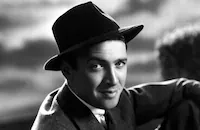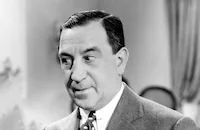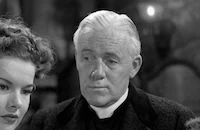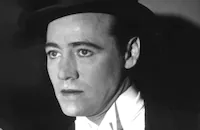On Our Merry Way
Brief Synopsis
Cast & Crew
King Vidor
Paulette Goddard
Burgess Meredith
James Stewart
Henry Fonda
Harry James
Film Details
Technical Specs

Synopsis
Recently married Oliver H. Pease has been pretending to his wife Martha that he is an investigative reporter for the Los Angeles Daily Banner when, in fact, he is employed there as a classified ad salesman. One morning, Martha gives him a question to pose to the public for his regular column: "What great influence has a little child had upon your life?" As he leaves for work, Oliver learns that all their furniture will be repossessed that evening, and at work, his bookmaker is waiting for him to pay up. After the real "Roving Reporter" dismisses Martha's question, Oliver approaches the editor, Mr. Sadd, telling him that he represents the publisher, who wants to improve the "Roving Reporter" column and has submitted a question to be used by Oliver, whom the publisher insists do the assignment. Mr. Sadd, who is unaware of Oliver's true role at the newspaper, has to agree and soon Oliver, followed by his bookie, asks the question around the city.
At a nightclub, he meets musicians Lank and Slim, who tell him about the time they became involved with a "baby": While touring in an impoverished band, their decrepit bus breaks down in a small beach community. In a coffee shop they meet the mayor's son, Zoot. Zoot is a terrible trumpet player but, in order to get money to repair the bus, Lank and Slim say that they can arrange for him to win a lucrative talent contest if he can persuade his father to let them run it. Maxim, the gas station owner who is repairing the bus, says that he wants to enter his "little girl" Lola in the contest. Lola turns out to be an attractive young woman who shows Lank and Slim that she can effortlessly play trombone, trumpet and clarinet. At the contest, on the end of a pier, after it is announced that first prize will be a two-week engagement with the band and that Lank will be the judge, Maxim shows up with band leader Harry James and installs him as the judge. When it is Zoot's turn to perform, Lank disappears beneath the bandstand to play for Zoot while he "fakes." Unfortunately, Lank is standing in a motor boat that starts rocking severely, causing him to become seasick, and Zoot to produce some very strange notes. Slim then introduces Lola, who dazzles the audience with her trumpet rendition of the same melody which Zoot and Lank attempted, and is awarded first prize by James. Later, Lola invites Slim and Lank to join her band in the bus her father has repaired for her.
After their story ends, Oliver goes back on the street and escapes from his bookie by scaling a wall and entering a house belonging to film actress Gloria Manners. Gloria answers Oliver's question by telling him about being a bit player in a film with child star Peggy Thorndyke and an old actor named Ashton Carrington. Peggy complains about Ashton forgetting his lines and is generally obnoxious, causing Ashton and Gloria to become very nervous. After Gloria ruins Take 37, she and Ashton are fired, but tell Peggy and her mother off. Gloria learns that Ashton has a script which would be perfect for her, and after Peggy comes to apologize, she offers to take the script to the studio head. Peggy also performs with them in an audition with the result that Gloria gets a contract and Ashton becomes her manager.
When Gloria's story ends, Oliver, still trying to avoid the bookie, climbs a fire escape and, at a window, meets Al. In response to Oliver's question, Al tells him about the time he and his fellow con man, Floyd, were driven by the police to the county line near Carson Corners: There, Edgar Hobbs, a young orphan boy posing as gangster Sniffles Dugan, holds them up at gunpoint and tells them he has a lot of money at his gold mine. When Edgar tells them that he lives with a rich uncle, Al and Floyd plan to return the runaway and claim a reward. After Edgar plays various practical jokes on them, Al goes into town to try to find the boy's uncle and discovers that he is president of the local bank. At his home, Al meets Edgar's sister, Cynthia, and learns that Uncle Eli does not want his nephew returned. Back in the hills, Al and Floyd are about to leave when they spot a policeman and Edgar threatens to tell him what they have been planning. Later, they return Edgar to his uncle, along with a pony they have bought, telling him it was an inducement to get Edgar to return home. When Al and Floyd ask Eli for the cash they spent on the pony, he threatens to call the sheriff so they agree to work for him. Oliver now discovers that Al has become a stage magician, has married Cynthia and she, Floyd and Edgar assist him in his act.
Back at the paper, Oliver is fired from his "classified" job for having been absent all day. Sadd, who has discovered his ruse, tears up his copy and throws him out, but later decides to read the column. Outside, the bookie roughs Oliver up and he is taken home by two policemen. He then tells Martha the truth but, much to his surprise, she welcomes him with champagne, because she has known all along about his job and does not mind. As the furniture is being taken away, Sadd comes to tell Oliver that he likes his column and asks him how he came to think of the question. Martha says that she gave it to him because she is going to have a baby. Sadd thinks this will make a great "topper" for the column which, henceforth, Oliver will be writing.

Cast

Paulette Goddard

Burgess Meredith

James Stewart

Henry Fonda
Harry James

Dorothy Lamour

Victor Moore

Fred Macmurray

William Demarest

Hugh Herbert

Charles D. Brown

Eduardo Ciannelli
Betty Caldwell
Dorothy Ford
Eilene Janssen
Frank Moran

Carl Switzer
David Whorf
Chester Clute
Leo Kaye
Max Wagner
George Davis
George Lloyd
Al Hill
Paul Hurst
Tom Fadden
Charles A. Hughes
Jack Cheatham
Damian O'flynn
Paul E. Burns

Greta Granstedt
Lucien Prival
Dewey Robinson
Bernie Friedman
Crew
Gordon Avil
Joseph Biroc
Benedict Bogeaus
Benedict Bogeaus
Jerry Bos
Lou Breslow
Ernie Burnett
Nick Castle
David Chudnow
Robert Cowan
Duncan Cramer
Joseph Depew
Ernst Fegté
Greta
Carley Harriman
Skitch Henderson
Arthur M. Landau
Ernest Laszlo
Frank Loesser
William Lynch
Otis Malcolm
Burgess Meredith
John O'hara
Arch Oboler
Robert Priestley
Eugene Redd
Heinz Roemheld
Henry Russell
Dave Schlegel
John Seitz
James Smith
Laurence Stallings
Ken Walters

Videos
Movie Clip




Film Details
Technical Specs

Articles
On Our Merry Way
The film, alas, can't measure up to the promise of its famous cast and directors, but it remains a fascinating curiosity nonetheless. It's an anthology movie (a brief trend of the era), comprising three separate stories tied together by a fourth. Shot and originally released under the title A Miracle Can Happen, it was the brainchild of star Burgess Meredith, who also produced (along with Benedict Bogeaus). Meredith had an idea for a film made up of several segments revolving around the theme of how a young child has affected adults' lives.
Meredith plays a classified-ad solicitor for a newspaper who has lied to his new bride (Paulette Goddard) that he is actually the paper's roving reporter. Desperate to save his home from foreclosure, Meredith finagles his way into actually being the roving reporter for one day, and he runs around the city asking various strangers how their lives have been affected by a kid; flashbacks reveal their self-contained stories.
Each segment features major stars and was the work of different writers and directors. MacMurray and Demarest play con men; Lamour plays an actress who goes from bit player to star; and Fonda and Stewart play broken-down musicians who rig a talent show only to have things go haywire. Theirs is by far the best episode, with the stars clearly having fun with a slapstick routine. They were close friends in real life and had never before worked together; they wouldn't re-team again until The Cheyenne Social Club in 1970.
Stewart and Fonda had their choice of writer and director, so naturally they chose the best: John O'Hara to write, and John Huston to direct. Work was interrupted when Fonda had to leave to fulfill some other commitments. When he returned, Huston was no longer available, but they were able to get George Stevens to step in and finish. Neither Huston nor Stevens took screen credit, however.
The Lamour and MacMurray episodes were directed by Leslie Fenton, and the framing story with Meredith and Goddard was directed mostly by King Vidor. Vidor's more important contribution to the film, however, ended up on the cutting room floor. Originally there was another episode featuring Charles Laughton as a minister loosely reinterpreting the Bible; supposedly this segment was excellent and touching. But the financial backers of On Our Merry Way, which was an independent film released by United Artists, complained that the Laughton episode was too serious for what was supposed to be a lighthearted comedy, and the story was deleted. David Selznick saw the segment and offered to buy it for $500,000 and construct an entire feature around it, but at the cost of discarding all the other stories. Bogeaus refused.
King Vidor was unhappy that his work with Laughton was never released. He later said: "I felt that the Laughton episode was most effective and thought it was absolutely ridiculous that it was not included in the film. It would have given a good rest from the expected laughter, and contrast always helps both the comedy and dramatic effect."
Shortly after its initial release, the film's original title A Miracle Can Happen was changed so that moviegoers wouldn't think it was some sort of religious drama. With all the different writers, directors, titles, story changes, deletions and restructuring, perhaps it was inevitable that On Our Merry Way wouldn't turn out for the best. Still, the chance to see so many top stars makes it an intriguing misfire.
More interesting trivia:
The MacMurray/Demarest episode is drawn from the O. Henry story "The Ransom of Red Chief," which was later adapted into the feature Ruthless People (1986) as well as several TV movies and foreign productions.
Burgess Meredith and Paulette Goddard were married at the time they filmed On Our Merry Way, making their opening scene of the two of them in bed something of an eye-opener.
In the Stewart/Fonda episode, look for a quick shot of Walter Huston blowing a horn during the talent show montage.
Producers: Benedict Bogeaus, Burgess Meredith
Director: Leslie Fenton, King Vidor; John Huston, George Stevens (both uncredited)
Screenplay: Arch Oboler, John O'Hara, Lou Breslow (story); Laurence Stallings (adaptation)
Cinematography: Gordon Avil, Joseph Biroc, Edward Cronjager, John F. Seitz; Ernest Laszlo (uncredited)
Art Direction: Ernst Fegte; Duncan Cramer (uncredited)
Music: Heinz Roemheld
Cast: Paulette Goddard (Martha Pease), Burgess Meredith (Oliver Pease), James Stewart (Slim), Henry Fonda (Lank Skolsky), Harry James (Himself), Dorothy Lamour (Gloria Manners), Victor Moore (Ashton Carrington), Fred MacMurray (Al), William Demarest (Floyd), Hugh Herbert (Eli Hobbs), Charles D. Brown (Mr. Sadd), Eduardo Ciannelli (Maxim), Betty Caldwell (Cynthia Dugan), Dorothy Ford (Lola Maxim).
BW-98m.
by Jeremy Arnold
Sources:
Clive Denton, The Hollywood Professionals Vol. 5: King Vidor
Raymond Durgnat, King Vidor, American
Burgess Meredith, So Far, So Good

On Our Merry Way
Quotes
Trivia
Notes
A Miracle Can Happen had a complicated history. It began production in mid-July 1946 with an episode starring Charles Laughton, but that episode was never used. The story dealt with a minister summoned by a young boy to the bedside of his seriously ill father. When they arrive at the house, the boy disappears. The father tells the minister that he did not send for him but is glad that he is there. The minister reads from the Bible to the bedridden father and he feels better. As he is leaving the minister sees a photograph of the boy and asks the father where the son is. The father then replies that the boy died many years before. In addition to Laughton, other cast members included Henry Hull, John Qualen, Almira Sessions and Orley Lindgren. This episode was directed by King Vidor and photographed by Edward Cronjager. In his autobiography, co-producer and star Burgess Meredith claims that he directed the Laughton episode and when his co-producer, Benedict Bogeaus, later told him that "the backers" wanted the episode eliminated, showed the film to David O. Selznick who offered a half-million dollars for that section with the intention of throwing out the other episodes and starting all over. Meredith stated that Bogeaus refused and that the footage was destroyed.
Shooting on the Laughton episode finished on August 3, 1946 and production on the other episodes resumed on 20 August with Vidor directing the sequences involving Meredith and Paulette Goddard, who were married to each other at the time. A 29 August Hollywood Reporter news item August reported that some filming was being done on the Goldwyn lot. On 4 Sep, the Hollywood Reporter reported that the Vidor/Meredith segments would finish shooting that day and that director Leslie Fenton would start the Fred MacMurray segment the following day. It was later reported that Fenton was filming far out on Ventura Boulevard, near Grant's Junction, in the San Fernando Valley.
A 13 September Hollywood Reporter news item reported that Skitch Henderson had been signed to compose and conduct the score for the film. On February 14, 1947, Hollywood Reporter reported that George Stevens was then shooting an episode of A Miracle Can Happen at General Service Studios. This was the James Stewart and Henry Fonda story. In a modern source, director John Huston stated, "In 1947, as a favor to Burgess Meredith, I directed an episode with James Stewart and Henry Fonda. . ." Apparently, when Huston was unavailable to finish the episode, George Stevens took over. An May 8, 1947 Hollywood Reporter news item indicated that A Miracle Can Happen would be previewed shortly in ten Eastern and Midwestern cities with the Laughton episode still in place. On 8 Aug, a Hollywood Reporter news item stated that Bogeaus planned to shoot a new episode and eliminate the Laughton episode, which was regarded as too serious for the otherwise light-hearted picture. On 1 Oct, the replacement episode, starring Dorothy Lamour and Victor Moore, started production at General Service Studios with Leslie Fenton directing and Ernest Laszlo as director of photography.
A Miracle Can Happen opened in New York on February 3, 1948 to less than ecstatic reviews: "A million dollar cast in a ten-cent film," stated the review in New York Daily News. On April 9, 1948, the Hollywood Reporter revealed that On Our Merry Way had been announced as the new title for A Miracle Can Happen, which had been pulled from release two months earlier after it had opened under the original title in New York, Philadelphia and Detroit. The news item further reported that subsequent polls of the public indicated that, because of the original title, the film was believed to have a religious theme and that the new title and advertising copy would point up the fact that the film is "a high comedy." When the film was originally released, it ran 108 minutes but in its re-release version, it ran 98 minutes, with the missing ten minutes probably cut mainly from the MacMurray episode. Copyright materials only relate to the 98 minute version. The pressbook for On Our Merry Way lists Fred Widdowson instead of Robert Priestley in the set decoration category. It also includes Scotty Rackin as Head Hairdresser and Skitch Henderson as an additional music supervisor. Henderson and Donald Kahn are also credited with writing the song "Baby Made a Change in Me," which could not be identified in the print viewed. The film's subsequent history involves legal disputes among the prinicipal participants and shareholders and, in 1953, the Security-First National Bank's foreclosure on its loan.
The CBCS lists the following actors whose appearance in the released film has not been confirmed, although it is likely that some of them appeared in the deleted Laughton episode: Nana Bryant, Walter Baldwin, Daniel Haight, Joe Devlin, Peggy Norman, Dick Scott and Broderick O'Farrell.


















